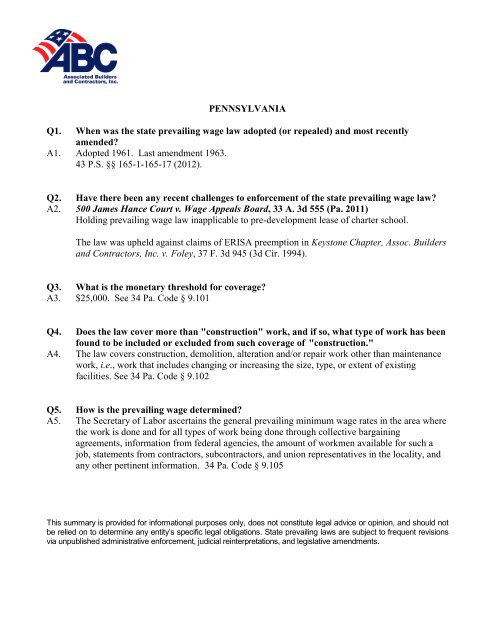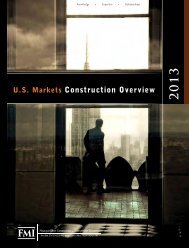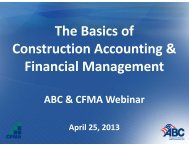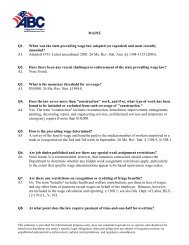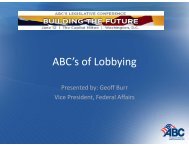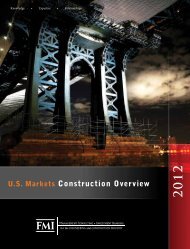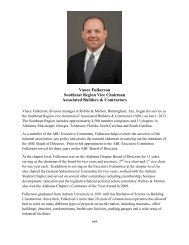abc prevailing wage summary - Associated Builders and Contractors
abc prevailing wage summary - Associated Builders and Contractors
abc prevailing wage summary - Associated Builders and Contractors
Create successful ePaper yourself
Turn your PDF publications into a flip-book with our unique Google optimized e-Paper software.
7/25/2012<br />
PENNSYLVANIA<br />
Q1. When was the state <strong>prevailing</strong> <strong>wage</strong> law adopted (or repealed) <strong>and</strong> most recently<br />
amended<br />
A1. Adopted 1961. Last amendment 1963.<br />
43 P.S. §§ 165-1-165-17 (2012).<br />
Q2. Have there been any recent challenges to enforcement of the state <strong>prevailing</strong> <strong>wage</strong> law<br />
A2. 500 James Hance Court v. Wage Appeals Board, 33 A. 3d 555 (Pa. 2011)<br />
Holding <strong>prevailing</strong> <strong>wage</strong> law inapplicable to pre-development lease of charter school.<br />
The law was upheld against claims of ERISA preemption in Keystone Chapter, Assoc. <strong>Builders</strong><br />
<strong>and</strong> <strong>Contractors</strong>, Inc. v. Foley, 37 F. 3d 945 (3d Cir. 1994).<br />
Q3. What is the monetary threshold for coverage<br />
A3. $25,000. See 34 Pa. Code § 9.101<br />
Q4. Does the law cover more than "construction" work, <strong>and</strong> if so, what type of work has been<br />
found to be included or excluded from such coverage of "construction."<br />
A4. The law covers construction, demolition, alteration <strong>and</strong>/or repair work other than maintenance<br />
work, i.e., work that includes changing or increasing the size, type, or extent of existing<br />
facilities. See 34 Pa. Code § 9.102<br />
Q5. How is the <strong>prevailing</strong> <strong>wage</strong> determined<br />
A5. The Secretary of Labor ascertains the general <strong>prevailing</strong> minimum <strong>wage</strong> rates in the area where<br />
the work is done <strong>and</strong> for all types of work being done through collective bargaining<br />
agreements, information from federal agencies, the amount of workmen available for such a<br />
job, statements from contractors, subcontractors, <strong>and</strong> union representatives in the locality, <strong>and</strong><br />
any other pertinent information. 34 Pa. Code § 9.105<br />
This <strong>summary</strong> is provided for informational purposes only, does not constitute legal advice or opinion, <strong>and</strong> should not<br />
be relied on to determine any entity’s specific legal obligations. State <strong>prevailing</strong> laws are subject to frequent revisions<br />
via unpublished administrative enforcement, judicial reinterpretations, <strong>and</strong> legislative amendments.
Q6. Are job duties published <strong>and</strong> are there any special work assignment restrictions<br />
A6. Job duties are not published, but rather the Secretary of Labor determines which jobs fall into<br />
which categories of work. 34 Pa. Code § 9.102. The Department’s regulations state that a<br />
workman using the tools of a craft who does not qualify as an apprentice must be paid the<br />
journeyman rate. 34 Pa. Code § 9.103(9). It is recommended that nonunion contractors should<br />
contact the Department to determine whether any hidden work assignment restrictions apply,<br />
particularly to the extent that specific <strong>wage</strong> determinations appear to be based upon union <strong>wage</strong><br />
scales. Recent litigation has presented issues concerning fair notice requirements applicable to<br />
changing interpretations of unpublished work assignment restrictions by the Secretary. See<br />
Worth & Co. v. Prevailing Wage Appeals Board, 12 WH Cases 2d 1342 (Pa. Comm. Ct.<br />
2007); see also Heist v. Prevailing Wage Appeals Board, 10 WH Cases 2d 988 (Pa. Comm. Ct.<br />
2003).<br />
Q7. Are there any restrictions on recognition or crediting of fringe benefits<br />
A7. Fringe benefits are included in the calculation of <strong>prevailing</strong> <strong>wage</strong>, but are limited to those that<br />
are paid “for the benefit of employees,” other than workers compensation, for sickness,<br />
disability, death, medical, surgical, hospital, vacation, travel expense, retirement <strong>and</strong> pension<br />
benefits. See 34 Pa. Code § 9.105; Keystone Chapter, Assoc. <strong>Builders</strong> <strong>and</strong> <strong>Contractors</strong>, Inc. v.<br />
Foley, 37 F. 3d 945 (3d Cir. 1994). Employers who do not offer such benefits must pay the<br />
difference in cash.<br />
Q8. At what point does the law require payment of time-<strong>and</strong>-one-half for overtime<br />
A8. Time <strong>and</strong> one half must be paid for any workweek in excess of forty hours, with certain<br />
exceptions. 34 Pa. Code §231.43.<br />
Q9. Are there defined apprenticeship ratios <strong>and</strong>/or special requirements for<br />
apprentices<br />
A9. Apprentices are limited as per a bona fide apprenticeship program approved by the<br />
Pennsylvania Apprenticeship <strong>and</strong> Training Council. 34 Pa. Code § 9.103<br />
Q.10 Are there criminal <strong>and</strong> civil penalties <strong>and</strong> is there a private right of action in addition to<br />
state enforcement<br />
A.10 After the Secretary has been notified of the failure to pay, through a workman complaint or<br />
otherwise, a hearing will be held to determine if the failure was intentional. If a failure to pay<br />
the <strong>prevailing</strong> <strong>wage</strong> was unintentional, the offending contractor will have the opportunity to<br />
correct the matter. If the failure was intentional (broadly interpreted by the Department <strong>and</strong> the<br />
courts), the contractor will barred from public contracts for 3 years after the Secretary was<br />
made aware of the offense. The Secretary may also request that the Attorney General take<br />
additional action to recover further penalties. A private right of action exists for workmen paid<br />
less than the general <strong>prevailing</strong> <strong>wage</strong> for their jobs, as long as the action is filed within 6<br />
months of the occurrence. 34 Pa. Code § 9.111, 9.112<br />
2


